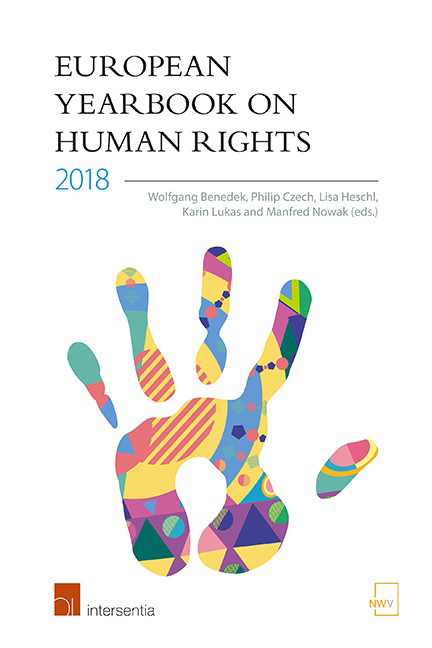Book contents
- Frontmatter
- Scientific Advisory Board
- Editors’ Preface
- Contents
- List of Abbreviations
- List of Contributors
- Part I Topic Of The Year
- Part II Eu
- Part III Coe
- The Jurisprudence of the European Court of Human Rights in 2017
- A Decade of Violations of the European Convention on Human Rights: Exploring Patterns of Repetitive Violations
- The Boundaries to Dialogue with the European Court of Human Rights
- Unprincipled Disobedience to International Decisions: A Primer from the Russian Constitutional Court
- The Impact of ECtHR and CJEU Judgments on the Rights of Asylum Seekers in the European Union: Adversaries or Allies in Asylum?
- The Human Right to Leave Any Country: A Right to be Delivered
- Some Reflections on the Principle of the Best Interests of the Child in European Expulsion Case Law
- Salafism in Europe: A Legal and Political Analysis of Human Rights and Security
- Delays in the Implementation of ECtHR Judgments: The Example of Cases Concerning Electoral Issues
- PART IV OSCE
- Part V Others
- Part VI Book Reviews
- Index
The Jurisprudence of the European Court of Human Rights in 2017
from Part III - Coe
Published online by Cambridge University Press: 31 January 2019
- Frontmatter
- Scientific Advisory Board
- Editors’ Preface
- Contents
- List of Abbreviations
- List of Contributors
- Part I Topic Of The Year
- Part II Eu
- Part III Coe
- The Jurisprudence of the European Court of Human Rights in 2017
- A Decade of Violations of the European Convention on Human Rights: Exploring Patterns of Repetitive Violations
- The Boundaries to Dialogue with the European Court of Human Rights
- Unprincipled Disobedience to International Decisions: A Primer from the Russian Constitutional Court
- The Impact of ECtHR and CJEU Judgments on the Rights of Asylum Seekers in the European Union: Adversaries or Allies in Asylum?
- The Human Right to Leave Any Country: A Right to be Delivered
- Some Reflections on the Principle of the Best Interests of the Child in European Expulsion Case Law
- Salafism in Europe: A Legal and Political Analysis of Human Rights and Security
- Delays in the Implementation of ECtHR Judgments: The Example of Cases Concerning Electoral Issues
- PART IV OSCE
- Part V Others
- Part VI Book Reviews
- Index
Summary
ABSTRACT
The article will give an overview of the European Court of Human Rights ‘ (ECtHR) most important judgments and decisions in 2017, that is to say judgments and decisions that contributed to the development or the clarification of the Court‘s case law in a considerable way. Those judgments covered a broad range of issues such as private and family life, data protection, the detention of asylum seekers, discrimination, the responsibility of a politician for his conduct during the financial crisis, the integration of Muslims in western society, the proportionality of measures envisaging the improvement of the social mix in certain underprivileged areas in order to avoid social problems or the applicability and violation of the right to a fair trial. The ECtHR also clarified the scope and interpretation of some provisions of the European Convention on Human Rights (ECHR) which have not been dealt with often so far in its case law, for example Article 18 ECHR or Article 2 of Protocol No 4 to the ECHR. Although the year 2017 brought a reduction of the number of pending applications to the lowest level since 2004, it must be kept in mind that the Court still faces big challenges regarding its workload. The observance of the subsidiarity principle will remain the key to the Convention system‘s success.
INTRODUCTION
In 2017, a significantly higher number of applications (63, 350) was allocated to a judicial formation than in the years before. Some 49,400 of these were identified as single-judge cases likely to be declared inadmissible, 13,950 applications were identified as probable Chamber or Committee cases. That general increase of applications can mainly be explained by a huge number of complaints (especially by journalists and judges taken into custody) coming from Turkey following the attempted military coup in 2016.
Nevertheless, the Court was able to reduce the number of applications pending before a judicial formation to 56,250 in 2017, as a very high number of applications (85,951) could be disposed of judicially. This was also because many of the above-mentioned Turkish applications could be decided very quickly by the Court.
- Type
- Chapter
- Information
- European Yearbook on Human Rights 2018 , pp. 229 - 266Publisher: IntersentiaPrint publication year: 2018

